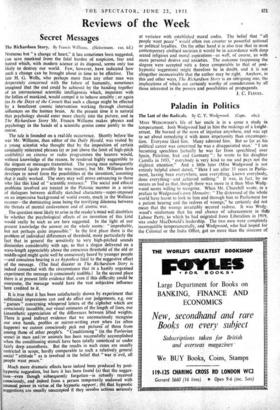Reviews of the Week
Secret Messages
The Richardson Story. By Francis Williams. (Heinemann. ros. 6d.)
No-rtitmc but " a change of heart," it has sometimes been suggested, can save mankind from the fatal burden of suspicion, fear and
hatred which, with modern science at its disposal, seems only too likely to destroy our world. Few, however, have indicated how such a change can be brought about in time to be effective. The late H. G. Wells, who perhaps more than any other man was desperately concerned with the future of humanity, sometimes imagined that the end could be achieved by the banding together of an international scientific intelligentsia which, impatient with the follies of mankind, would compel it to behave sensibly • or again (as In the Days of the Comet) that such a change might be effected by a beneficent cosmic intervention working through chemical influences on the human brain. At the present time it is natural that psychology should enter more clearly into the picture, and in The Richardson Story Mr. Francis Williams makes physics and psychology in the hands of a scientific genius come jointly to the rescue.
The tale is founded on a real-life occurrence. Shortly before'tho war Mr. Williams, then editor of the Daily Herald, was visited by a young scientist who thought that by the imposition of certain constantly reiterated phrases (at or just above the limit of high-pitch audibility) on cinema or radio programmes the hearers would, without knowledge of the reason, be rendered highly suggestible to the slogans or messages transmitted. The young man subsequently disappeared (quite possibly he was insane), but Mr. Williams hero develops in novel form the possibilities of the invention,' assuming that it really worked. The story may well prove entrancing to those who like this kind of "scientific romance." The social and ethical problems involved are treated in the Platonic manner in a series of dialogues between skilfully sketched characters—super-imposed on an impressive background of world events, much in the Wellsian manner—the dominating issue being the terrifying dilemma between the threats of mental enslavement and of atomic war.
The question most likely to arise in the reader's mind will doubtless be whether the psychological effects of an invention of this kind would really be such as are here suggested. In the light of our present knowledge the answer on the whole seems: " improbable, but not perhaps quite impossible." In the first place there is the problem of individual differences of threshold, more particularly the fact that in general the sensitivity to very high-pitched sounds diminishes considerably with age, so that a slogan delivered on a wave-length appreciably above the conscious threshold of the old or middle-aged might quite well be consciously heard by younger people —and conscious hearing is ex hypothesi fatal to the suggestive effect of the message. (The final disaster in The Richardson Story is indeed connected with the circumstance that in a hastily organised experiment the message is consciously audible.) In the second place there is at present little evidence that, even if this difficulty could be overcome, the message would have the vast subjective influence here credited to it.
It is true that it has been satisfactorily shown by experiment that subliminal impressions can and do affect our judgements, e.g. our " guesses" concerning whispered letters of the alphabet which are consciously inaudible, our visual estimates of the length of lines, our kinaesthetic appreciation of the differences between lifted weights. There is good indirect evidence that we unconsciously recognise our own hands, profiles or mirror-writing even when (as often happens) we cannot consciously pick out picturei- of them from among those of other people's. "Conditioning" (in the Pavlovian sense) in man and/or animals has been successfully accomplished when the conditioning stimuli have been totally unnoticed or under fairly deep anaesthesia. But the results in such cases are usually restricted in scope, hardly comparable to such a relatively. general social "attitude" as is involved in the belief that " war is evil, all people want peace."
Much more dramatic effects have indeed been produced by post- hypnotic suggestion, but here it has been found (a) that the sugges- tion—even though subsequently forgotten—is actually received consciously, and indeed from a person temporarily endowed with unusual power in virtue of the hypnotic rapport ; (b) that hypnotic suggestions are usually unaccepted if they involve actions seriously at variance with established moral codes. The belief that "all people want peace " would often run counter to powerful national or political loyalties. On the other hand it is also true that in most contemporary civilised societies it would be in accordance with deep seated religious and moral aspirations--as well, of course, as with more personal desires and anxieties. The outcome (supposing the slogans were accepted with a force comparable to that of post- hypnotic suggestion) might therefore be in doubt, and it is not altogether inconceivable that the author may be right. Anyhow, in this and other ways, The Richardson Story is an intriguing one, the implications of which are certainly worthy of consideration-by all those interested in the powers and possibilities of propaganda.
J. C. FLUGEL.


















































 Previous page
Previous page